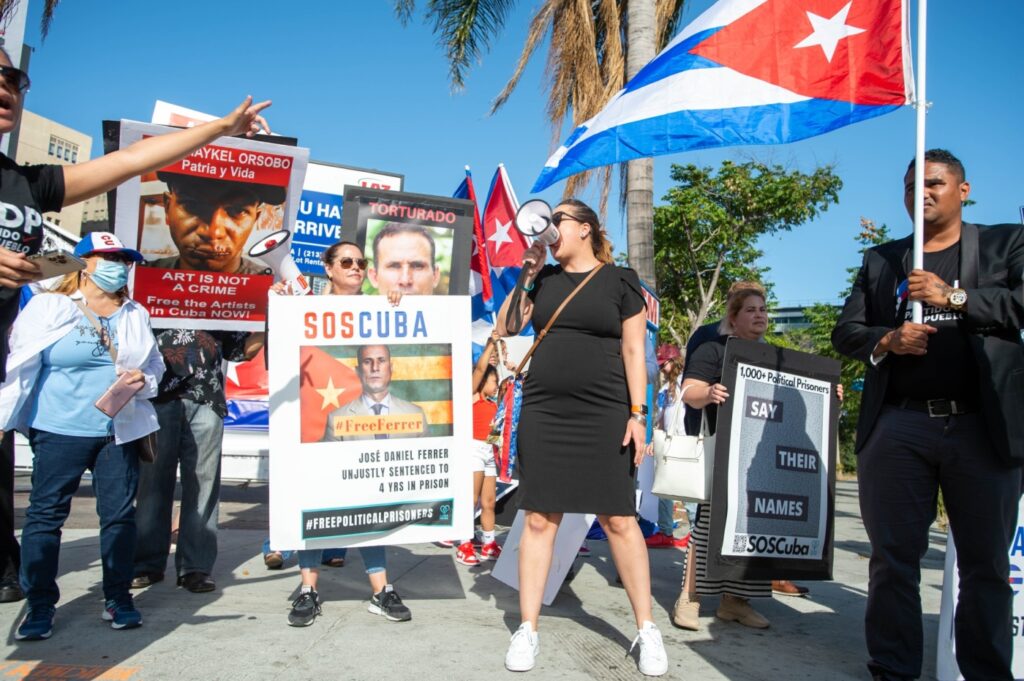
While Cuba protests exclusion from the America’s Summit in Los Angeles, stressing the importance of respectful civic dialogue, the world’s eyes should take notice on how protest inside the island is handled.
It’s certainly not with a respectful eye toward civic dialogue, much less debate.
Since last year’s summer protests — thousands, including kids — remain behind bars.
Human rights organizations have identified over 1,400 Cubans detained during the July 11-13, 2021 nonviolent protests.
Trials of what are now called 11J protesters — named after the July 11 popular outburst — continue with prison sentences of up to 30 years for yelling anti-government slogans in the street while banging pots and pans or recording them.
When these national protests broke out, Cuban President Miguel Díaz-Canel, handpicked by Cuba’s actual ruler Raul Castro, appeared on state television shortly after the protests started, saying, “the order of combat is given, revolutionaries take to the streets.”
This command incited regime security forces to commit violence: shooting and killing unarmed demonstrators.
But unlike on other occasions inside Cuba, many of these atrocities were recorded and uploaded to the internet.
Authorities recognized one death in these protests.
Diubis Laurencio Tejeda, a 36-year-old singer, was shot in the back by the National Revolutionary Police (PNR) in Havana on July 12.
There are many others who can’t are accounted for.
Christian Díaz, age 24, disappeared after joining the protests. Relatives on July 12 reported him missing to the PNR in Cárdenas. Police told his father that Christian was jailed in Matanzas.
On Aug. 5, officials informed his family he’d drowned in the sea and was buried in a mass grave.
His family is convinced he was beaten to death.
There are many others, but they have not been officially recognized as family members have been threatened to keep silent.
There was also a harsh approach to those residents who documented abuses.
On July 11, 2021 Exeynt Beirut, age 41, was detained in Guantanamo, Cuba for taking part in the protests.
He was sentenced to four years in prison.
His father Fredy, age 64, and sister Katia, age 36, who went out the next day to film the protests were each sentenced to 20 years in prison.
German tourist and dual citizen Luis Frómeta Compte was sentenced to 25 years in prison on December 23, 2021 for spontaneously filming a demonstration in Havana for private purposes with his smartphone while visiting relatives and was subsequently arrested.
Regime officials are also punishing Cubans who speak out about their imprisoned loved ones.
Rolando Castillo was arrested on May 18, 2022 and then had an “express trial” without an attorney and sentenced to two years in prison, with less than two hours notice for his hearing.
His crime?
Protesting the arrest of his 17-year-old son Rowland Jesús Castillo Castro, who is now serving an 18-year prison sentence for protesting on July 11, 2021.
Related Articles
One million Americans are dead of COVID
The fallout of Assembly Bill 5 is a cautionary tale the nation must heed
Summit of (some of) the Americas is here
Newsom (probably) can’t lose this November
Chesa Boudin’s recall and the future of criminal justice reform
Yudinela Castro Pérez, mother of 18-year-old Rowland Jesús Castillo Castro, an 11J protester condemned to 12 years in prison, was arrested and taken to the secret police headquarters in Havana on Feb. 24, 2022. Because she was outspoken in defense of her son, Yudinela was charged with contempt and detained for 15 days. Days after her release Yudinela attempted suicide, but survived.
Unfortunately, the island’s repressive side is nothing new.
Cuban citizens continue to be systematically denied fundamental human rights available in any country invited to the Summit of the Americas, including the right to freely express themselves and associate freely.
John Suarez is executive director of the Center for a Free Cuba.
